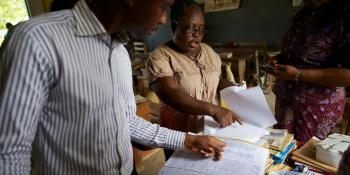Rebuilding the Social Compact
Rebuilding the Social Compact
We investigate whether strengthening the link between local
tax collection and urban service delivery can increase citizens’
willingness to pay their taxes, improve service delivery, enhance
local politics, and ultimately revitalize the social compact.
We investigate whether strengthening the link between local
tax collection and urban service delivery can increase citizens’
willingness to pay their taxes, improve service delivery, enhance
local politics, and ultimately revitalize the social compact.
Understanding the Social Compact
If citizens perceive little benefit from their tax payments, or local services are disconnected from local decision-making, the link between citizen and state can be broken. This can create a vicious cycle where citizens do not receive high quality services because resources are limited by low levels of local tax revenue. The low quality of services further leads to a low willingness to pay taxes in addition to a broader lack of trust in the state.
The social compact between citizen and state – whereby a citizen pays taxes and receives public goods and services – is a critical link in the development process. This link is especially salient in the context of local governments as public service provision is a significant metric by which local governments are judged. Can information build a bridge between citizens and their government, improving the social compact?
Our Research
This study seeks to examine how to break this cycle through a series of reforms that strengthen the link between the provision of local services and local property tax collection in urban Pakistan. While approximately 70% of property tax revenue in Pakistan currently goes to the local government, citizens currently do not have information regarding how much of their taxes, if any, is spent on local services. Further, they don't know how local services are chosen, or whether those services are the ones they desire.
We aim to increase the link between taxes paid and local services received by enhancing the linkages between:
- Local preferences and the types of local urban services provided, and
- The amount of local tax revenue and amount of local services provided
The goal is to reduce evasion of local property taxes, increase the quality of local services, make local urban services more responsive to local needs – and ultimately to help repair the social compact between the citizenry and the state.
Primary Investigators
Asim Ijaz Khwaja
Benjamin Olken, MIT
Adnan Khan, LSE
This Research is Supported by the
National Science Foundation (NSF)
International Initiative for Impact Evaluation (3ie)
Abdul Latif Jameel Poverty Action Lab’s (J-PAL's) Governance Initiative
International Growth Centre (IGC)
Abdul Latif Jameel Poverty Action Lab’s (J-PAL's) Urban Services Initiative
Highlights
Asim Khwaja’s experiments in taxation aim to buttress the legitimacy of government in developing nations.
EPoD researchers aim to improve government tax capacity and understand citizens’ willingness to pay.








